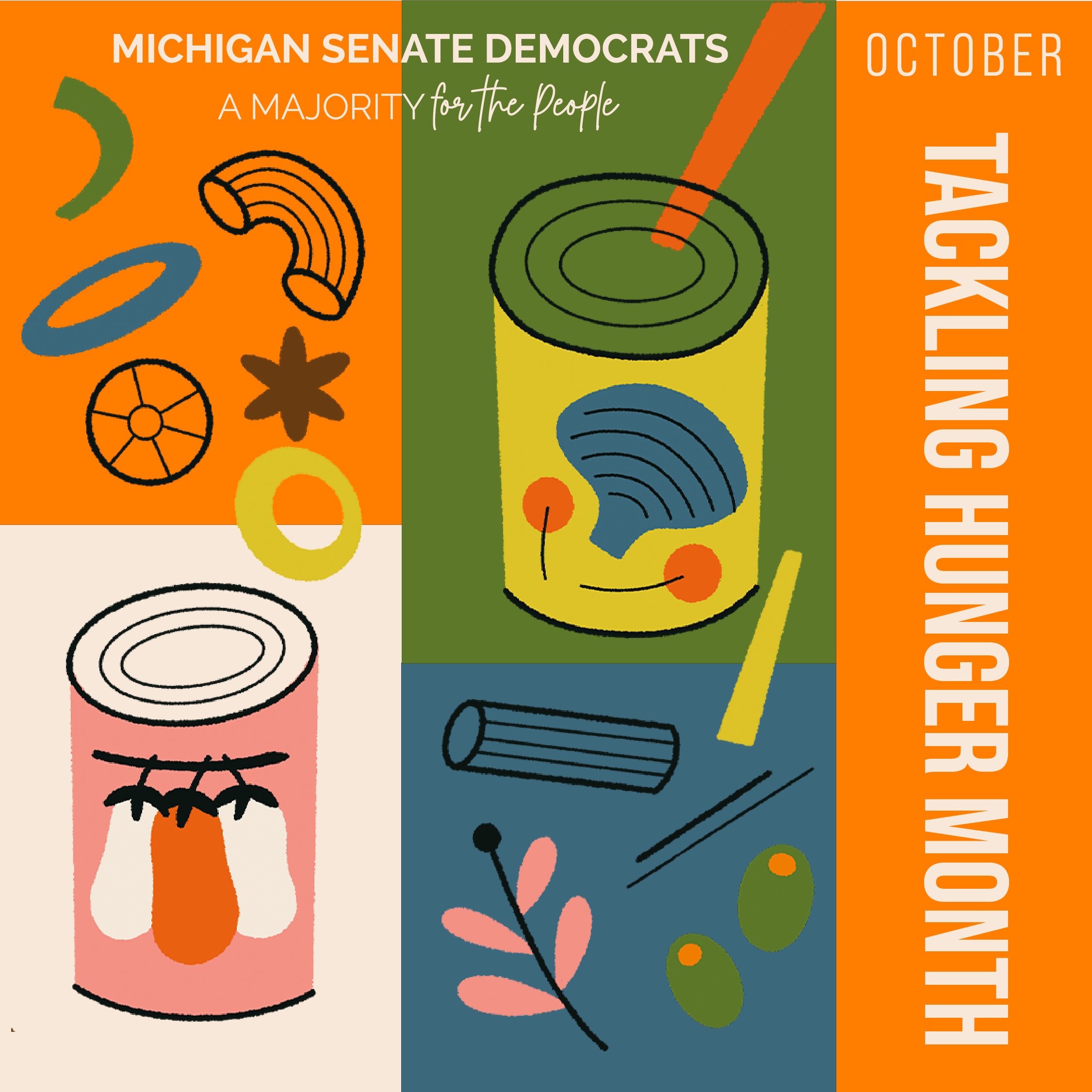No matter what we look like or what zip code we call home, we all deserve to have access to quality, nutritious food to nourish our minds and bodies. Yet, the disturbing reality is that both here in Michigan and across the country, food insecurity is on the rise. In a recent report from the U.S. Dept. of Agriculture (USDA), 13.5% of U.S. households were food insecure at some point within 2023, meaning they had trouble providing enough food for their family due to a lack of resources. Similarly, in Michigan, about 13% of households faced low or very low food insecurity between 2021-2023.
As October is recognized as “Tackling Hunger Month,” there’s no better time to shine a light on ways that Senate Democrats have been combatting food insecurity across our state.

Here’s 10 ways Senate Democrats have been tackling hunger in the state of Michigan:
1. Expanding Access to Free School Meals
Building on the success of the universal free school meals program that began last year, Senate Democrats used the 2025 state budget to provide another year of free breakfast and lunch for all public school students. This investment saves Michigan families approximately $850 a year on food costs.

Senate Appropriations Chair Sarah Anthony, Senate Appropriations Pre-K-12 Subcommittee Chair Darrin Camilleri and Sens. John Cherry and Kristen McDonald Rivet pose with Gov. Gretchen Whitmer and other state officials at the Education Budget signing on July 23, 2024.
“We have a responsibility to ensure every student has what they need to be their best self, and we know that part of that formula for success is access to healthy, nutritious food,” said Sen. Sarah Anthony (D-Lansing). “This year’s budget builds on the progress we have made by continuing to fund free breakfast and lunch for all Michigan students while making smart investments in our state’s agriculture and local food economy.”
2. Continuing Support for Double-Up Food Bucks Program
With Michiganders struggling to afford the high cost of food, the Fair Food Network’s Double-Up Food Bucks program has been an essential way to make fresh produce more accessible by stretching SNAP food assistance benefits when used to purchase fruits and vegetables at participating farmers markets and retail stores. Proven to be mutually beneficial for Michigan households, farmers, and food retailers, Senate Democrats allocated an additional $5 million to the program in the state budget.
3. Securing Funding for 10 Cents a Meal Program
Another win for tackling hunger in the 2025 state budget was Senate Democrats’ decision to continue funding the 10 Cents a Meal for Michigan’s Kids and Farms program. Strengthened with a new $4.5 million investment, the program provides match incentive funding up to 10 cents per meal to schools, early care and education centers, and other institutions that participate in USDA Child Nutrition programs to purchase and serve Michigan-grown fruits, vegetables, and dry beans. It’s a win for both our kids and local farmers!
“I believe all kids need fresh, healthy food to be able to learn, and that’s why we fought to secure $4.5 million for the 10 Cents a Meal program,” said Sen. Darrin Camilleri (D-Trenton). “This investment will expand students’ access to local and nutritious food while bringing communities together, and I’m proud to support it.”
4. Investing in Sportsmen Against Hunger
Senate Democrats generously allocated half a million dollars in the state budget to support Michigan Sportsmen Against Hunger, an all-volunteer nonprofit that creatively connects local hunters with licensed wild game processors to harvest deer for families in need. To date, they have donated over 1,151,678 pounds of venison to food banks, pantries, and shelters, providing nutritious meat from the backyards, forests and fields of Michigan to dinner tables around the state.
5. Expanding State Credit for Struggling Families
Last year, Senate Democrats delivered a huge boost to working Michiganders by increasing the state’s match of the federal Earned Income Tax Credit (EITC) from 6% to 30% — the most significant increase to the credit in state history. Surrounding tax season earlier this year, Senate Democrats spread awareness of the credit, known as the Working Families Tax Credit, urging eligible Michiganders to take advantage of it. The EITC increase will save 700,000 Michiganders around $3,150 a year, helping families keep their groceries stocked as well as rent, childcare and other expenses paid.
6. Improving Access to SNAP Benefits
The Senate acted in bipartisan fashion last summer by passing legislation to end asset testing requirements that determined eligibility for food assistance in Michigan, often referred to as the Supplemental Nutrition Assistance Program, or SNAP. SNAP is a crucial support for folks across the state, helping one in 10 Michigan workers put food on the table. Now law, this crucial change will reduce obstacles to Michiganders getting the support they need and increase their ability to build wealth.
Sen. Jeff Irwin (D-Ann Arbor) speaking on the Senate floor in support of Senate Bill 35, his legislation to eliminate the state’s asset test for SNAP, and the importance of food assistance programs.
7. Combating Food Deserts
Food deserts, areas where people have limited access to healthy foods, can be found in both urban and rural communities across the state. Senate Democrats included $3 million in the state budget for the Michigan Independent Retailers Association to aid Michigan’s grocers, food wholesalers, and retail merchants in addressing this need by increasing access and consumption of healthy food, reducing obesity rates, increasing food security, and improving the local economy.
8. Bringing Farm-Fresh Produce to Michigan Tables
In an effort to increase access to locally grown food across Michigan, Senate Democrats secured funding for a new “Farm to Family” program in the state budget. This program will enhance Michigan’s food and agriculture industry by supporting regenerative farming, strengthening supply chains, and bringing Michigan-grown crops to homes around the state.
9. Reducing Hunger on College Campuses
To make sure food isn’t out of reach for our college students, Senate Democrats provided $500,000 within the state budget for a one-year pilot program at Michigan State University, Northern Michigan University, Macomb Community College, and Grand Rapids Community College to reduce hunger on campuses through the establishment of campus food pantries, campus meal plan credit donations, and various additional policies.
10. Connecting Seniors to Food Assistance
The MiCafe Network is an invaluable program in our state, helping seniors navigate the state food assistance program (SNAP) while also connecting them with other benefits and resources they might find helpful. Senate Democrats passed the state budget with a $100,000 boost for the program, run by Elder Law of Michigan, ensuring our state seniors can access the assistance they need, when they need.
Sens. Hertel, Moss, and Shink talking with seniors about food access and helpful resources available to them at recent events.
It goes without saying — hunger is a serious problem with serious consequences, impacting all areas of an individual’s life, from their health to their financial stability and overall well-being. Folks who are food insecure are more likely to experience health complications such as diabetes, obesity, and high blood pressure. Kids who experience food insecurity suffer the effects on their physical and mental health and academic achievement. With one in six children facing hunger in the state of Michigan, we must keep working to improve food security.
From continuing the free school meals program for our students to ensuring seniors across our state can access food assistance, we’ve made significant groundwork in combating food insecurity in our state. Senate Democrats remain committed to tackling this issue so that no Michigander has to choose between putting food on the dinner table or keeping the lights on.



